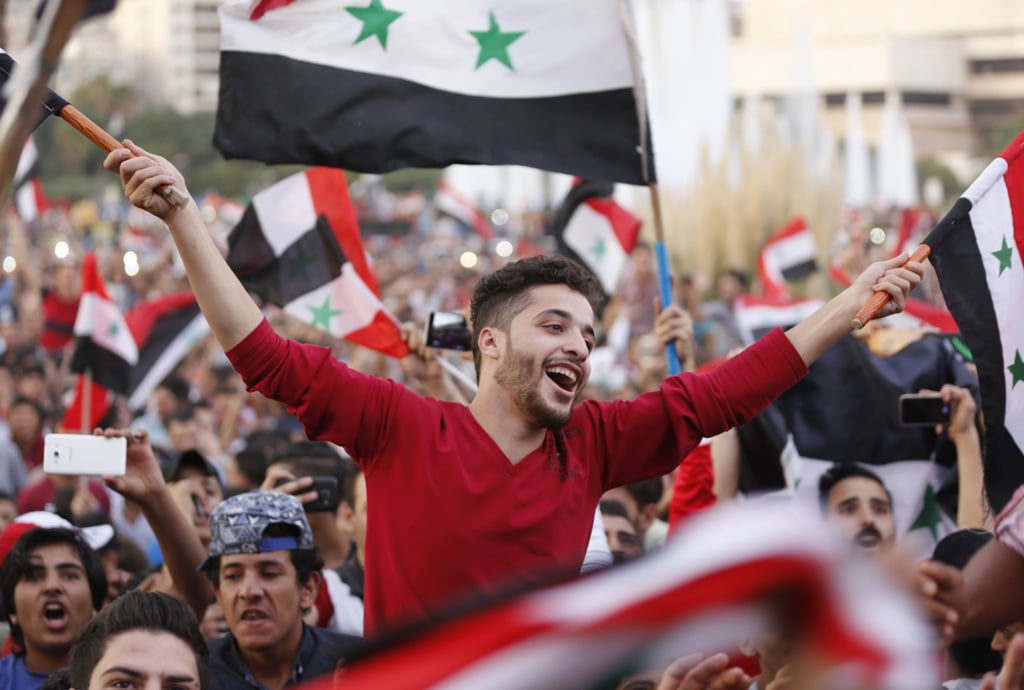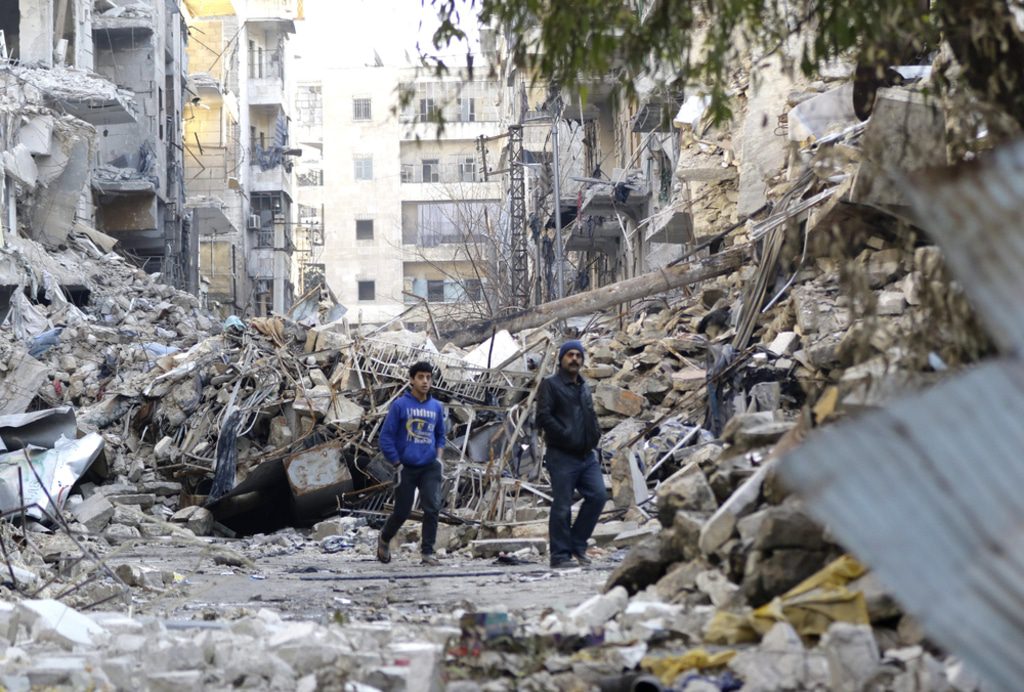
While battles rage on in Deir Ez-Zor and Hama, and the siege of the rebel-held Damascus suburb of East Ghouta continues, in late 2017 a semblance of normal life is returning to other parts of Syria.
Even as the war appears to be winding down, 6.5 million people remain internally displaced and more than 5 million live as refugees outside the country. The reconstruction process has begun in some government-controlled areas, but wide swathes of the country are left in ruins, without even basic infrastructure.
The rise of the Syrian National Football Team, which narrowly missed qualifying for the World Cup this year, crystallized hopes for many inside and outside Syria of a return to normal life and national unity. Facebook was awash with the hashtag #yes_we_can and calls to ‘cheer for the Qasioun Eagles’. Crowds packed into cafés in Damascus to watch each match. But hopes of a first-ever place in the World Cup were dashed with the team’s 2-1 loss to Australia in a nail-biting qualifying game on 10 October 2017.
Yet even football was not a cause all Syrians could rally around. While some opponents of President Bashar al-Assad’s regime cheered for the national team, others dismissed it as a tool of the political establishment and some even cheered the Australian win.
The football drama was typical of daily life in Damascus and other areas relatively unscathed by seven years of war, where civilians continue to study, work and seek out entertainment, despite high prices, food, and energy shortages, and occasional outbreaks of violence.
Sarah, a student in the coastal city Latakia who works with NGOs that distribute aid to internally displaced people, said that although there is no fighting where she lives, life is not entirely normal. Displaced people have flocked to Latakia from Aleppo and other areas destroyed in the war, which has led to rising prices and competition for available jobs.
“So many families have left their homes and come here looking for safety, looking for a better life,” she told Fanack Chronicle. “The problem is families can’t afford the cost of living.” The economic pressures and ongoing fighting have resulted in depression among many of the youth, she said, but they continue to seek out simple pleasures.
“People look for joy from cheap things like sitting in a café and playing cards with friends, and actually, for most of the youth in Latakia, this is their main activity,” she said. “This is how they feel they have control over their life.”
On the bright side, Sarah said, many factory owners whose businesses in Aleppo were destroyed or abandoned have relocated in Latakia, bringing jobs and economic activity. But most of the workers the factories hire are from their home cities, she said, and once the situation in those cities improves, both the factories and workers will likely return. Some manufacturing facilities have already begun to reopen in Aleppo, which before the war was Syria’s industrial heartland, although not without problems.

One textile factory owner who moved his operations to temporary facilities but is now clearing up the debris to open his old factory, listed the many challenges to news agency Reuters: “Our biggest problem is electricity. There are also very few workers because everyone’s in the army. Sanctions affect the work. Customers can’t come here. Transferring money is difficult. It’s hard to buy spare parts.” Other business owners who have moved to neighboring countries are contemplating a return but are waiting to see if the security situation improves.
In the capital, the Damascus International Fair, a major annual trade fair, returned this summer for the first time since the war started in 2011. The event, attended by businesspeople from more than 45 countries, was touted as a sign of the increasing stability in Syria, but it did not pass without a reminder of the ongoing conflict: six people were killed when a mortar bomb hit the entrance to the fair.
One obvious sign of the effects of the war is the dearth of young men, as many – both supporters and opponents of the regime – have fled to avoid compulsory military service, which is widely perceived as a death sentence. Others have been killed or are fighting in the army or in militias.
With a few exceptions, military service is required of men between the ages of 18 and 42, and travel outside the country is restricted for young men of military age. Deferments are available for students, which has led to many young men finding creative ways to prolong their education. However, the Syrian Arab Army’s General Directorate of Conscription recently issued new rules that will revoke the deferment for men who sign up for a one-year postgraduate teaching diploma in a subject unrelated to their undergraduate degree. Some young men pay hefty fees or bribes to obtain a deferment. Others, unable to pay, continue to flee the country.
As a result of the shrinking male population, more young women are remaining single and finding jobs. Not everyone has accepted this change in gender roles, as the international humanitarian organization CARE noted in a recent report on Syrian women in the workforce.
Yet recognizing the changing demographics, trade groups have begun making efforts to develop women’s enterprises. These include the Aleppo Chamber of Commerce, which recently held an exhibition in which more than 70 businesswomen displayed their products. Meanwhile, non-governmental organizations like Women Now for Development are pushing for women to have a seat at the table as their country is rebuilt.
The form that rebuilding will take will likely be the biggest question facing Syrians in the coming years. It already seems likely that allies of the regime will be the major beneficiaries of the rebuilding projects, while those who backed the rebels, including the United States, will be cut out.
For instance, in September 2017, the Syrian government announced a deal with Iran for the construction of a new power plant in Latakia, rehabilitation of power facilities in Aleppo, and other energy projects. Likewise, in October 2017, Electricity Minister Mohammad Zuhair Kharboutli discussed cooperation to rehabilitate and support the electricity system in Syria by establishing power-generating stations and future projects with a visiting Russian delegation headed by the Deputy Minister of Energy Kirill Molodtsov.


